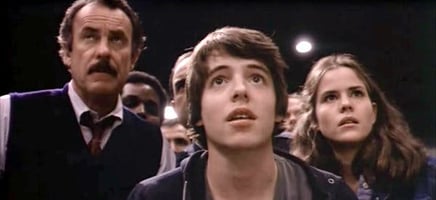The first time I heard “Rock Lobster” by The B52s, it was a cathartic experience. I had not heard...
You Will Be Found
I am a crier. It’s not a secret. Anytime there is something emotional happening on the television that my family and I are watching, they turn ever so slightly to me to see if the tears are forming. And 90% of the time, they are (the other 10% is when I have already wiped them away without their notice). Movies, shows, commercials – I am an equal opportunity crier.
When I first saw the trailer for the Broadway-show-now-movie, Dear Evan Hansen, I knew I was doomed. You see, I knew what the story was about having read up on it. I avoided seeing it on Broadway for years. I knew I would be a blubbering mess. Wearing a raincoat into the theater would have caused some stares to come my way (actually, it is New York City, so maybe not). As I have gotten older, I realize more what it is that causes me to respond this way (I should mention that I don’t think it is a problem – to my fellow criers, carry on). It’s brokenness.
The first time I had to sit with an employee who shared that he was going to die from cancer, I wept. I sat in the moment with the person and just listened and shared in the heartbreak. This employee wanted to keep working as long as he could and did not want his team to know that he was facing this, at least not right away. He wanted to lead his own story and not have “HR” take the reins. I didn’t want that responsibility, so I was happy to let him lead. What I could do, however, was take the lead in checking in with him and being broken with him.
It's in that compassion that our work has depth. Were my policies great for leave management should he need to use it? Of course (spot on, actually). But the humanity needed took precedence and should have. And while that may not seem earth-shattering to you, there are varying types of brokenness that people face. Are we as adept in offering compassionate consideration despite thinking that the issue at hand isn’t that deep?
Once, someone sat with me and shared that she was struggling to balance work, pursuing a Masters in the evening and having time for herself (to work out, watch a movie, read a book). At that moment in time, I was working 60 hours per week and had 3 children (ages 9, 7, 5); I was trying to figure out how to be a better partner to my wife in raising the family. And now this person was struggling with all of her “self-centeredness” when I hadn’t had a good night’s sleep in years? I could have said, “You know what? Joe shared with me that he’s dying of cancer. Your difficult schedule pales in comparison to what he’s facing.” To what end would that lead? To make her feel badly? To scold her for facing the truths in her current situation? No. She, too, deserved compassion, and that’s what she got.
For any of us, our frame of reference and season of life influences some of where our brokenness is found. And while the young lady in the previous account was not living the same season as I was, she was expressing stress and strain through tears in that conversation. It was real for her, and she was not sure how to move beyond it. It’s okay for her to feel how she did. In 20 years, she may look back on that time and long for those types of problems instead of what she may be currently facing, just like any of us would and maybe already have. But for that day, she was broken based on what was in front of her.
Compassion can be offered at each of those stages. To an adolescent about to embark into the waves of middle school, to a first-time, full-time worker nervous about what work will be like, to a new mom or dad worried about what kind of parent he/she/they might be, to someone experiencing loss for the first time – in all these situations, we can offer compassion in our listening and in our responsiveness.
When I watch Dear Evan Hansen on the big screen, I will fall into the story. I will feel what those characters are feeling. I will put myself into that moment. And my heart will break for the story being shared. It doesn’t matter whether you are an “emotional” person or not, you can still feel something and tap into that to develop your compassionate responses to others. And in that journey, some self-discovery will take place. You will be found.



.png?height=200&name=Humareso%20Blog%20Posts-2-Missing%20You%20(2).png)
Blog comments